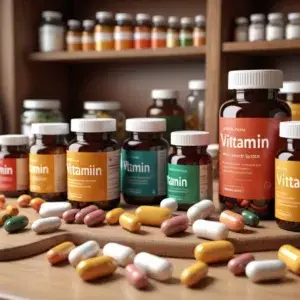Table of Contents
With the increasing demand for brain supplements, people are increasingly looking for items that can improve cognitive function and memory, as well as guard against age-related cognitive decline. However, given the wide number of options available, it is critical to thoroughly assess these supplements to verify that they are safe and effective. This article will walk you through the major aspects of choosing brain health supplements, emphasizing the relevance of certifications and organizations that may help you make informed judgments.
Understanding the Purpose and Benefits of Brain Supplements
Before selecting brain supplements or vitamins, it is critical to understand its intended use. We often classify brain health supplements into one of three categories:
Cognitive Enhancers: These supplements aim to boost mental functions like memory, concentration, and problem-solving skills. People frequently employ ingredients like Bacopa monnieri and Ginkgo biloba due to their potential cognitive benefits.
Neuroprotective Agents: These supplements aim to shield the brain from harm, particularly as we age. Researchers have linked cognitive deterioration to oxidative stress, which antioxidants like astaxanthin and curcumin can help lower.
Mood and Emotional Health: By regulating neurotransmitters and reducing stress, certain supplements aim to enhance emotional well-being. L-theanine and Rhodiola rosea are known for their calming properties.
Understanding the exact purpose of brain supplements allows you to personalize your selection to your health objectives. For example, if you’re concerned about age-related memory decline, a supplement with neuroprotective effects could be most beneficial.
Assessing the Safety and Effectiveness of Brain Health Supplements
When it comes to brain supplements, safety and efficacy are of the utmost importance, particularly those focusing on brain health. Here’s how to evaluate these factors:
- Human and Animal Studies: Seek out brain supplements that have undergone clinical testing in humans. Animal research can yield valuable insights, but human studies have a more direct impact on our health. Astaxanthin, for example, has shown promise in animal models for prolonging longevity and boosting cognitive function, and research is currently underway to confirm similar effects in humans.
- Dosage and Bioavailability: Appropriate dosage and bioavailability are critical. Supplements such as omega-3 fatty acids (found in fish oil) must be taken in sufficient quantities to cross the blood-brain barrier and provide cognitive benefits. Be aware of supplements with dosages that appear too low to be helpful.
- Side Effects: Always keep potential side effects in mind, especially when using a product for an extended period of time. For example, while Ginkgo biloba is typically safe, it can interact with some drugs, highlighting the importance of seeing a healthcare provider before beginning any new supplement.
The Importance of Purity Control in Brain Health Supplements
Purity is a crucial factor in determining whether brain supplements are safe and effective. Unfortunately, not all brain supplements on the market are the same, and contamination and mislabeling are prevalent. Here’s how you can make sure you’re purchasing a high-quality product:
Third-Party Testing: Select brain supplements that independent third-party labs have evaluated. These tests confirm that the product contains exactly what the label says, with no dangerous contaminants. NSF International and ConsumerLab offer these services, providing you with confidence in the product’s quality.
Good Manufacturing Practices (GMP) Certification: Facilities adhering to high quality and purity standards make GMP-certified supplements. The FDA oversees GMP standards in the United States, and supplements manufactured in GMP-certified facilities are less likely to contain contaminants or improper dosages.
USP Verified: The United States Pharmacopeia (USP) is another institution that analyzes and confirms supplements for quality, purity, and effectiveness. Products bearing the USP Verified symbol have passed stringent testing requirements, making them a dependable choice for customers.
Identifying Reputable Certifications and Organizations
To verify the safety and usefulness of brain health supplements, check for certifications from respected organizations. These certificates indicate that the product has met high quality criteria.
NSF International: An independent organization that provides certification for dietary supplements, NSF International ensures that products do not contain harmful levels of contaminants and that they meet label claims.
ConsumerLab: This organization tests dietary supplements for identity, purity, and potency. They also test for potential pollutants, such as heavy metals. Products that pass their tests can have the ConsumerLab seal.
USP Verified: As previously mentioned, supplements that meet rigorous quality criteria receive the USP Verified logo. The world recognizes this certification as a reliable indicator of a product’s quality.
Informed-Choice and Informed-Sport: These certifications are especially significant for athletes because they guarantee that supplements are devoid of forbidden ingredients. Even if you’re not an athlete, these certifications may boost your supplement purity confidence.
How to Apply This Information When Choosing a Brain Health Supplement
When selecting brain supplements, it is critical to adopt a holistic approach, taking into account all aspects of the product, including its intended usage, safety, efficacy, and purity. Here are some steps to take:
- Define Your Health Goals: Begin by determining what you hope to achieve with the supplement. Are you looking to enhance memory, improve focus, or protect against cognitive decline?
- Investigate the Ingredients: Examine the supplement’s active ingredients to determine whether scientific studies back them up. Check that the dosages used in trials correspond to what is in the supplement.
- Verify Certifications: Verify if the supplement holds certifications from reputable organizations like NSF International, USP, or ConsumerLab. These certifications guarantee the purity of the product and its inclusion of the claimed ingredients.
- Consult a Healthcare Professional: Before beginning any new supplement, especially one that targets brain health, consult with a healthcare practitioner to confirm it is safe for you, especially if you have underlying medical conditions or are taking other medications.
- Track Your Results: After you begin taking a supplement, pay attention to how you feel and whether you notice any changes in cognitive performance. It’s also crucial to be aware of any adverse effects.
Choosing the correct brain health supplement is more than simply selecting a product from the shelf. Understanding the purpose of the supplement, analyzing its safety and efficacy, checking its purity, and seeking credible certifications will allow you to make an informed decision that benefits your cognitive health. Consult a healthcare physician before starting any new supplement regimen, and opt for products that have undergone extensive testing and received recognition from reputable organizations. With the appropriate technique, you may select a brain-health vitamin that will actually enhance your mind and well-being.








This is a fascinating read! I’m curious about how different brain supplements interact with each other—can combining certain types lead to better cognitive benefits, or should some be avoided together? Also, how long do you usually need to take these supplements before noticing any significant effects? It’s great that you emphasize choosing high-quality, pure ingredients. What are some key indicators of a trustworthy supplement brand? Thanks for diving deep into a topic that’s so important for mental health!
HI Cornelius thanks for stopping by. If you are looking to combine different nootropics or brain supplements together I would be mindful of the ingredients. Where there are common ingredients between the supplements you would want to ensure that the combined dosage is still within the daily range for that particular ingredient. I would also suggest just commencing with 1 supplement and giving it time to see how your body responds to it before you introduce another supplement, particularly if some of the ingredients are common to both supplements.
This article does a great job of highlighting the importance of brain supplements in supporting cognitive health, but it also raises some important questions for me. Firstly, when it comes to assessing the safety and effectiveness of brain health supplements, how can consumers navigate the sea of information out there? While the article mentions the importance of certifications like NSF International and USP, what are the best ways to verify these claims ourselves? Is there a specific process or a list of trusted sources that can help us make informed decisions?
On the topic of purity control, I’m curious about the real-world experiences others have had with third-party testing and GMP-certified supplements. Has anyone here had success with a particular brand that adheres to these rigorous standards? It would be helpful to hear about the effectiveness and any noticeable improvements in cognitive function.
I also appreciate the detailed breakdown of different types of brain supplements—cognitive enhancers, neuroprotective agents, and mood stabilizers. I’ve personally used Bacopa monnieri for memory enhancement and noticed a slight improvement in focus, but I wonder if anyone else has tried combining it with other ingredients like Ginkgo biloba or L-theanine? If so, what was your experience in terms of results and any side effects?
Lastly, I think this website does a commendable job of simplifying complex topics like brain health, making them accessible to a broader audience. It’s evident that a lot of thought went into ensuring the content is both informative and actionable, which I find valuable. However, given the critical nature of brain health, I would love to see even more interactive content, perhaps like a quiz to help guide users toward the most suitable supplement based on their individual needs and goals.
Looking forward to hearing others’ thoughts and experiences on this topic!
Hi Lawrence thanks for stopping by. Your comment and questions are very insightful. When it comes to checking certifications like NSF International and USP, it’s a good idea to look for these seals on the product’s packaging or website and verify them directly with the certifying organization.
For real-world experiences, looking at trusted reviews can be helpful, especially from brands that clearly show they do third-party testing and follow GMP standards. It’s awesome that you’ve seen some benefits from Bacopa monnieri! Combining it with other supplements like Ginkgo biloba or L-theanine can work well, but it’s always best to check with a healthcare professional to be sure it’s right for you.
And I love your idea about adding interactive content like a quiz—we’re definitely considering ways to make the site more engaging!
Thanks Steve